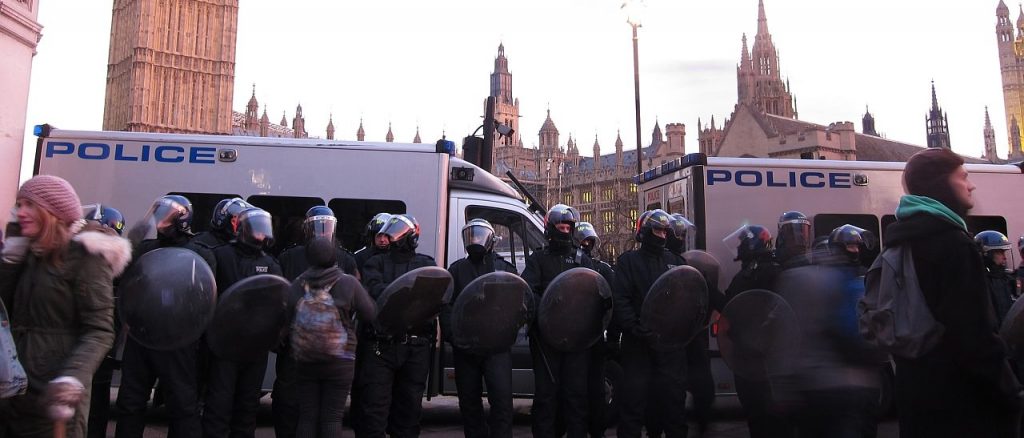On 4th August 2022, Campaign Against Arms Trade (CAAT) and the Network for Police Monitoring (Netpol) will release a report exposing the militarised nature of British policing.
A Very British Problem: The Evolution of Britain’s Militarised Policing Industrial Complex exposes the increasingly blurry line between the police and the military. It further shows that a war mentality has infiltrated policing – from counter-terrorism to anti-protest policing to border control to the policing of gangs.
The report focuses on several key areas. These include the paramilitary policing of protests; border control and counter terrorism; surveillance; the private tech sector; and Britain’s global role in militarised policing.
Report author Dr Keren Weitzberg stated:
Militarised policing is a longstanding British phenomenon with deep roots in the country’s colonial past. The police are increasingly relying on high-tech, data-driven, and military-grade technology to surveil the British population, and through the exchange of ideas, tactics and technologies, the UK government has played an outsize role in shaping global trends in militarised policing
Sam Perlo-Freeman, Research Coordinator at CAAT stated:
Policing in the UK is becoming steadily more repressive; but it’s not just about what the UK is doing to its own citizens. The UK trains foreign police and security services, especially around border control. “Britain is also the second biggest arms trader in the world and the fourth largest exporter of security technology. It is a major supplier of anti-protest equipment, such as tear gas, riot shields, and rubber bullets, as well as telecommunications interception technology – often to countries with terrible human rights records and a history of repressive policing. This means the UK is complicit in repressing protest across the globe
Emily Apple, Communications Coordinator at Netpol stated:
This report busts the myth that the police in the UK govern, or have ever governed by consent. It lays out, what those from marginalised communities know all too well, that institutionalised and structural racism results in over policing, excessive force and disproportionate criminalisation. Even before the Police, Crime, Sentencing and Courts Act (PCSC), the police used their powers to excessively surveil and repress protest and label activists as domestic extremists or aggravated activists. The undercover policing scandal shows the lengths the police will go to to spy on and disrupt anyone dissenting from the status quo – whether that’s anti-arms trade protesters, families for justice campaigners or environmental activists. With the PCSC Act we’re more likely to see increased criminalisation and surveillance of protesters. It’s down to all of us to monitor what the police are doing and to defend our right to dissent.
Siana Bangura, writer, producer, and campaigner, said:
When it comes to militarised policing, it’s time for Brits to face up to our very British problems.
———————————————————-
Download the full report here.
Download the Executive Summary here.
For more information, contact CAAT – [email protected], or Netpol, 07873122402

